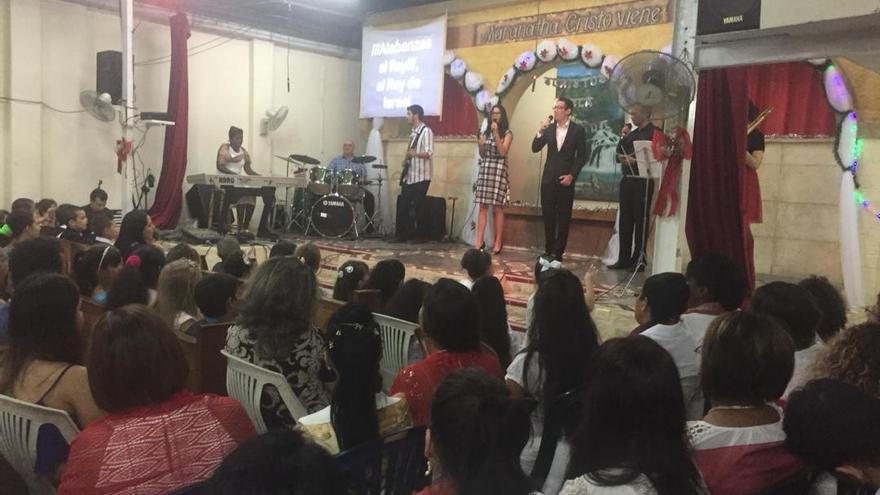
![]() 14ymedio, Havana, 6 June 2019 — The Cuban government has decided to revoke its permission to build a Baptist church in eastern Cuba in what could be a reprisal for the position of the Christian community on the constitutional referendum held on February 24, as reported by Pastor Amado Ramírez in a telephone conversation from Holguin.
14ymedio, Havana, 6 June 2019 — The Cuban government has decided to revoke its permission to build a Baptist church in eastern Cuba in what could be a reprisal for the position of the Christian community on the constitutional referendum held on February 24, as reported by Pastor Amado Ramírez in a telephone conversation from Holguin.
“We had all the permits in order, but we were informed by the Office of Religious Affairs of the Central Committee of the Communist Party that the building permit had been canceled,” Ramírez explained. The authorities said that the request would be studied by the Council of Ministers, the highest administrative and executive body in the country and that this could take “some time.”
El Nuevo Herald tried unsuccessfully to communicate with Caridad Diego, head of the religious affairs office of the Communist Party.
“Our church is one of the oldest in the province, founded in 1932 and the first to be organized in the city of Holguín, said Ramírez, who lamented that his community has had to spend more than $1,500 in proceedings, when the average salary on the island is around 30 dollars a month, according to official figures.
The pastor believes that the revocation of the construction permit could be “closely related” to the critical position of his church onlast February’s constitutional referendum. The evangelical congregations opposed several of the articles of the new constitution, forcing the government to eliminate Article 68 that would have allowed equal marriage and replace it with Article 82 with the promise of a plebiscite to consult the country on a new family code.
The campaign of the evangelical churches took the State and Cuban civil society by surprise, even requesting permission to publicly demonstrate against an initiative headed by Mariela Castro, the daughter of the ex-president Raul Castro. Several pastors denounced pressures by the Communist Party to join the campaign in favor of the approval of the constitutional reform referendum.
The Maranatha Baptist Church, in the city of Holguin, had received the necessary permission to build a new temple in February 2017 from the Provincial Department of Justice after a long legal battle. The religious leaders subsequently processed the permits before the Ministry of Science, Technology and Environment and the Institute of Physical Planning, which took a year and a half.
From then on, the pastor along with his religious leaders began “a long and tortuous process” to obtain the construction license issued by Physical Planning. For the negotiations, they had to go to the Ministry of Science, Technology and Environment as well as to the offices of Physical Planning in Holguín, paying numerous fees.
Maranatha had been subjected on other occasions to the fury of the government. In May 2015 the authorities tried to confiscate the temple but after several international demands rescinded the order. According to Ramírez, about 700 Baptists gather in the temple each Sunday and the church has grown in other neighborhoods of the capital of Holguin, carrying out an extensive missionary and charitable work.
Evangelical churches in Cuba have experienced a rapid growth after the religious opening that the country experienced in the 90s. The Methodist Church has more than 80,000 faithful, while other denominations also have hundreds of “temple houses” throughout the country.
“Holguín was the province that had the most votes against the new constitution, especially the municipality of Moa, which has a large number of Christians,” the pastor added. According to the religious leader, after the approval of the constitutional reform, the dialogue between the Christian churches and the government “has stopped somewhat.”
According to official data, the new constitution was approved with more than 6.8 million votes for Yes, but with historic levels of abstention and votes against that totalled more than 1.8 million voters. The government waged a fierce campaign for a Yes vote through the media and waged a war of repression activists and opponents who asked voters to reject the constitutional reform.
CSW, an international NGO dedicated to the promotion of human rights and specializing in religious freedom, rejected the decision of the Cuban government to revoke the construction permit for Maranatha Baptist Church.
“The use of government bureaucracy and the endless requirements for permits that can be arbitrarily canceled at any time is the typical way the Cuban government seeks to control and restrict freedom of religion or belief on the island,” said Anna-Lee Stangl, CSW’s Head of Advocacy in Defense of Religious Freedom.
“We call on the Cuban government to simplify and make transparent procedures for religious associations to build and repair buildings, and we continue to demand reforms so that religious groups are no longer hostages to these arbitrary and manipulative decisions,” she added.
____________________________
The 14ymedio team is committed to serious journalism that reflects the reality of deep Cuba. Thank you for joining us on this long road. We invite you to continue supporting us, but this time by becoming a member of 14ymedio. Together we can continue to transform journalism in Cuba.
